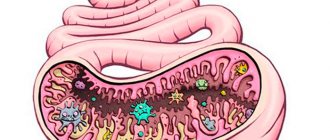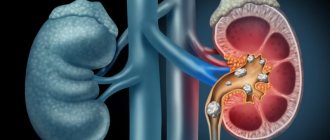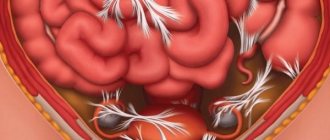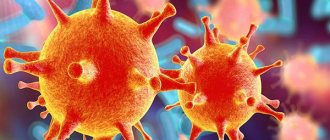Why do you feel sick after eating fish?
Nausea is a very unpleasant reaction of the body to various odors or food that has entered the stomach, but it is simply not possible to consider it a separate disease.
It only indicates the presence of various pathologies and abnormalities in the body. Moreover, nausea is often a precursor to vomiting. We are accustomed to its appearance after poisoning, and nausea due to great worries does not frighten us. In these situations it is a completely natural reaction of the body. But, if you notice that you feel sick after smoked fish, fried meat, or some other fatty foods, then this means that it’s time for you to see a gastroenterologist.
However, one should not exclude individual intolerance to certain products or the odors that come from them. In this case, I would like to pay special attention to fish.
Stomach hurts after eating fish
Quite often, the stomach begins to ache after eating if a person eats incorrectly. The following factors can provoke pain, heaviness in the stomach and other unpleasant sensations:
- a lifestyle in which a person eats 1-2 times a day and eats a lot at one time is stressful for the stomach;
- the habit of drinking a lot of liquid while eating or overeating - the walls of the stomach are stretched;
- intolerance to certain products, for example, dairy or fish - the reaction to eating them can be bloating, nausea, cramps, upset stool;
- abuse of heavy, unhealthy foods - fatty, spicy, fried, pickles, smoked meats, fast food - has a detrimental effect on the gallbladder and causes stomach pain;
- very cold or hot food has a traumatic effect on the stomach;
- low-quality, stale products can cause poisoning, one of the symptoms of which is cramping pain.
Diseases and pathologies of the stomach that cause pain
With systematic abuse of food that is difficult to digest, irritable stomach syndrome can develop, a disease manifested by cramps, heaviness and pain in the first hours after eating. Other symptoms of this condition include:
- belching that does not stop for 1-1.5 hours;
- causeless nausea;
- heartburn not associated with the consumption of specific foods;
- with prolonged course – loss of appetite and weight.
The appearance of abdominal pain after eating can be caused by various reasons; therefore, treatment for such conditions will depend on the cause of the disease. The pain has a different character, which also indicates its different etiology. Therefore, when developing a therapeutic regimen, the need to determine the cause of the pain syndrome comes to the fore.
This diet is prescribed by a doctor for a period of 6 to 12 days. The duration depends entirely on the patient's condition.
This diet is designed for people who have worsened ulcers or gastritis. In this case, increased stomach acidity is noted.
The diet is considered quite gentle. All dishes are prepared steamed or boiled. Food should be semi-liquid or liquid. It is recommended to eat food up to 6 times a day, taking equal breaks of 2-3 hours.
For the vast majority of city residents, stomach troubles have become the norm of life. Ate - suffered - digested. Let’s make a reservation right away: don’t be afraid to go to the doctor with something that seems “nonsense” to you and “will go away on its own.” The earlier the disease is detected, the easier the treatment and faster the result.
In the meantime, check out the most common causes of abdominal pain and discomfort.
Note! A properly composed menu makes it possible to get rid of pain in the stomach area without the use of medications and prevent complications of various diseases of the digestive system.
Cutlets must be steamed
- milk (no more than 4 tbsp. per day);
- pureed vegetable broth;
- pureed milk porridge;
- vegetable oils;
- wheat crackers (no more than 100 g).
- chronic gastritis with increased or preserved secretion;
- exacerbation of acute gastritis.
- dried bakery products;
- fermented milk products (in small quantities);
- lean meat;
- sauces and various marinades;
- canned food;
- ungrated vegetables, sweet and sour fruits;
- chocolate, kvass, black coffee and ice cream;
- cabbage, turnips, radishes, fresh and pickled cucumbers, onions and sorrel.
Nausea after eating manifests itself as an extremely uncomfortable state, which is accompanied by rapid pulse, pallor, increased salivation, and weakness throughout the body.
We analyze the causes of nausea from odors
Today's pace of life often contributes to eating disorders. We eat quickly so as not to slow down, to be in rhythm. Fast food and other things are harmful to health. And if you remember that many people like to smoke and drink alcohol, then their health may worsen in their youth.
Since childhood, many people have been familiar with the phrase “stomach pain.” By itself, as we understand, the stomach cannot hurt - the cause of discomfort always lies in a disorder occurring in one of the organs of the abdominal cavity. Pain in the abdomen has multifaceted symptoms and can signal various ailments. Accordingly, treatment tactics will be different in each specific case.
How does the pancreas hurt, symptoms
https://www..com/watch?v=d-yrombLsPc
You can cure the pancreas without drugs or other physical intervention. Modern medicine, unfortunately, very often only fights the consequences of the disease, but in fact we need to look for the cause.
Healers can completely cure and heal the pancreas without consequences or operations. With this method of treatment, the effect occurs at the energetic level both on the gland itself and on the cause of the disease.
The pancreas is cleansed, toned, restored, strengthened, supported and rejuvenated.
Stomach cramps - what is it and how to treat it?
In case of poisoning, gastric lavage and administration of activated carbon or other sorbents are indicated. No-spa, spasmolgon will help relieve spasmodic pain in the stomach; for aching pain accompanied by heartburn and nausea, we can recommend Motilak, Motilium, they should be taken before meals, 15-30 minutes.
But these medications are symptomatic; they do not affect the cause of pain. Therefore, if almost every meal you eat is accompanied by stomach pain, although you eat right, you need to consult a doctor and undergo an examination to identify the disease causing the pain.
First of all, if you have stomach pain, you should contact a gastroenterologist; in some cases, consultations with an endocrinologist, neurologist, or nutritionist may be recommended. For most diseases that cause stomach pain, a diet is indicated.
The stomach is one of the most important organs in the entire human digestive system, since the main process of food processing occurs here. And any deviations in the functioning of the organ negatively affect the general condition of the person.
Pain is the main symptom that accompanies almost all diseases of the organ. Quite often, in addition to pain, a person experiences severe heartburn. It is the methods of eliminating such symptoms that will be discussed.
Heartburn as a sign of inflammation of the gastric mucosa
First of all, you need to understand what heartburn is. Heartburn is a rather unpleasant condition for a person, accompanied by a burning sensation in the esophagus and often an unpleasant sour taste in the mouth.
Stomach cramps are a symptom of functional dyspeptic disorders or pathological conditions of the gastrointestinal tract, which is characterized by spasmodic contractions of the smooth muscles of the stomach, and is accompanied by pain in the epigastric region (under the xiphoid process of the sternum), sometimes with nausea, vomiting, belching, and bloating.
Features of diet No. 1a
This diet for the stomach involves food steamed or boiled in water.
Food must be wiped. It is allowed to bake dishes, only without a crust. Meals should be taken at least 4-5 times a day. Cold and very hot foods are prohibited.
It is recommended to stick to this diet for 3 to 5 months.
She is appointed after table No. 1a. Having stopped the acute stage of ulcers and gastritis, it is recommended to use this diet. Diet No. 1b is as gentle as possible on the stomach. It allows you to create favorable conditions that promote the healing of ulcers and eliminate inflammation.
The diet includes foods that have been steamed or boiled. According to the diet, all dishes must be consumed by the patient in semi-liquid or puree form. It is important not to forget about the thermal regime. The optimal temperature for served dishes is 40-50 degrees Celsius.
6 meals a day are recommended. The break between meals should not exceed 3 hours.
Food should not be hard or rough
It is good for the pancreas to eat small portions, but often. It is necessary to monitor the temperature of the food you eat. It should not be cold, but not hot either. This principle of nutrition should be followed for 3-5 months, after which the patient begins to feel better.
It is better to eat dried bread, yesterday's bread
Source: https://giwot.ru/posle-ryby-bolit-zheludok/
Negative reaction to smell
Agree, seafood products have a very specific smell, which is not suitable for every person.
Therefore, sometimes you can start to feel sick even from the rather pungent aroma that remains for a long time after fried fish. And what can we even say about the fetid odor that intensely spreads from such a rotten product. It will not be surprising if in this case it comes to vomiting. If you do not have any other negative reaction of the body to this product, and you have never had an allergic reaction to it, then such a specific smell that causes nausea can be easily eliminated and you can continue to eat your favorite sea delicacies. Before frying fish, you should soak it in vinegar, and if you have already cooked it incorrectly, the smell can be eliminated with sunflower oil or lemon.
If you want to remove odors from kitchen utensils, rub them with mustard and wash them off with cleaning products.
If you cannot stand the smell of mud that is present in those specimens caught in a river or swamp, then buy this product only in trusted and licensed stores, and not from individual fishermen, who are often very unscrupulous in choosing a place for fishing. After all, such products can not only make you sick, they pose a direct threat to your life.
Nausea can also be triggered by the smell of phenol - this is the so-called “pharmacy smell”. The fish absorbs it from reservoirs into which various wastes are poured, so eating such meat is also very dangerous.
But, if you are a woman and you feel sick after eating fish, or even just from its very smell, then you should not exclude toxicosis, the cause of which is the most common pregnancy.
Nausea after eating
There are also situations when one begins to feel sick almost immediately as soon as a person eats fish. This is explained by the following indicators:
- Allergic reaction to this product. If it is present in your body, then there is nothing left to do but exclude this product from your diet.
- Overeating. If you start to feel nauseous after eating too much fish, then cool a glass of mineral water or unsweetened fruit juice and drink the food in small sips.
- Opisthorchiasis is a disease in which infection with opisthorchiasis (helminths) occurs. To avoid getting worms into the body, you should prepare the fish properly. To do this, keep it on the fire for at least 30-40 minutes.
- Problems with the pancreas or liver. If you feel sick after fried fish, then this may definitely indicate a disease of these organs.
- Poisoning. Low-quality fish, like any other product, can cause intoxication of the body.
How to eliminate nausea?
In order to eliminate nausea and get rid of very unpleasant sensations, you should use fairly simple tips:
- Drink a warm drink. A slightly sweet tea would be a good option. But it’s better not to drink them cold or hot; on the contrary, it will be an irritant for the stomach. Decoctions of chamomile, ginger or mint help well. In addition, it is necessary to give up milk, since it promotes fermentation processes.
- Take a special medicine, such as Emitrol, which contains phosphoric acid, which will relieve stomach irritation. In case of poisoning, Sorbex helps well, as it absorbs all toxins and neutralizes their effect.
- To soothe your stomach, you can put a warm compress with clove or lavender oil on it.
- Don't eat anything fatty. Better treat yourself with a sour lemon or pickled cucumber. You can drink Borjomi.
- If you still want to satisfy your hunger, then eat food in small portions.
- An excellent folk remedy is sauerkraut brine. It contains alkali, so it promotes good digestion.
- And remember, if you feel sick after eating fish, you should definitely understand the reasons for this reaction of the body. It would be a good idea to contact a gastroenterologist in order to start treatment in a timely manner before the situation becomes dire.
Fish poisoning: symptoms and treatment
Fish is a healthy product in all respects, however, its consumption should not be thoughtlessly, but carefully. Indeed, among many food poisonings, fish is not in last place. Firstly, this is a perishable product, secondly, it is not always subject to long-term temperature treatment, and thirdly, there are dishes in which raw fish is served.
Salted fish is no exception. In a word, eating not only boiled, fried, but also smoked and dried fish can be dangerous for the patient. In most cases, fish poisoning occurs in the warm season due to poor-quality storage, as well as during periods of special demand, when sellers “quietly” try to get rid of spoiled goods.
Causes
Experts identify mainly two causes of fish poisoning:
- Bacterial. In this case, the main factor is considered to be improper storage; this may involve prolonged exposure of raw fish to high temperatures. This also includes secondary freezing of the product. In addition, the reason may be that the fish was poorly cooked or fried. Storage conditions also have an effect, when products are kept together and infection with harmful bacteria from other products occurs, after which they begin to actively multiply and produce toxins in the fish itself. After consuming such a product, the patient begins to develop an intestinal infection.
- Fish poisons. In most cases, various kinds of toxins are found in fish that live in tropical waters, such as sea bass, barracuda, yellowtail and some other species. Ciguatoxin can be found in their tissues - it causes ciguatera. Even more dangerous, often leading to death, can be caused by eating, for example, fish such as fugu and some other species containing tetrodotoxin. In this case, even the most thorough heat treatment will not be able to rid the product of the toxins it contains.
It should be noted that poisoning can be obtained not only from the species of marine fish listed above, but from any, since its safety can be negatively affected by its habitat and ecological situation, because poisons easily accumulate in the tissues of fish from algae and the water itself.
In addition (they should be highlighted separately), mackerel fish, for example, mackerel, horse mackerel and others, can also pose a risk of poisoning. Although this is expressed in most cases not by poisoning, but by an allergic reaction. These fish themselves do not contain poisons, but a substance can accumulate in their tissues, which, under appropriate conditions, is converted into saurin. And it, in turn, can provoke the development of an allergic reaction in the form of itching and redness of the skin. Disorders of the cardiovascular system and gastrointestinal tract may also occur.
Why does my stomach hurt after eating fish?
Poisoning is a disorder of the normal functioning of the body, which develops against the background of the spread of toxins and poisons in it. A synonymously close concept is the category “intoxication”.
There are a great many factors that can cause poisoning in a person - household chemicals, poisons, medications, various chemicals and reagents, alcohol, low-quality or expired food.
Food poisoning can occur after eating a variety of foods, from fruits and vegetables to canned goods, drinks and ready-made meals. At the same time, one of the most dangerous food poisonings for humans is poisoning from fish and seafood.
What is fish poisoning and why is it so dangerous for humans?
Fish is considered a nutritious and healthy product, which doctors and nutritionists advise to include in the diet, especially for children and the elderly.
It contains fatty acids, proteins, a complex of vitamins and minerals, including phosphorus. Sea fish is rich in bromine and iodine, unlike its river “sister”.
Its benefits for the brain, cardiovascular system and musculoskeletal system have long been known to both doctors and ordinary people.
Does this mean that fish in the human diet always brings only benefits? Unfortunately, it is not. It is known that fish, like meat, is a perishable product.
In addition, fish can live and be caught in a variety of water bodies, even those that are heavily polluted and saturated with harmful waste. Living in dirty, poisoned water, the fish absorbs all the toxic elements from it, and itself becomes a source of poisons.
In addition to the results of human activity, which poison many water bodies on the planet, various bacteria, microorganisms, and pathogens also live in water bodies.
In fatty varieties, chlorinated hydrocarbons, mercury, polychlorinated biphenyls, and dioxin can accumulate in large quantities.
Another danger is that even normal, healthy fish caught in a clean reservoir, before it reaches the buyer, may have time to deteriorate due to improper storage or processing conditions, due to the expiration date, or violation of the temperature regime.
Parasites, helminths, poisons and toxins may appear in such a product as a result of the vital activity of such “inhabitants”.
However, this fact practically does not bother sellers and manufacturers of fish products, so both in the market and in the supermarket you can find fish of the so-called “second freshness”, or even completely spoiled.
Separately, canned fish should be mentioned - an ordinary can of sprat in a tomato, if the process of fermentation and bacterial growth has begun in it, can cause the death of a person.
The combination of “fish + canned food” is especially dangerous, since under conservation conditions the product is in a sealed, almost vacuum-sealed form, and all processes, including pathogenic ones, develop concentrated in it.
The growth of botulism bacteria in canned food is especially dangerous.
Main types of fish poisoning
Depending on which factor caused the accumulation of toxins in consumed fish, the following types of fish intoxication are distinguished:
- bacterial, which occur due to the proliferation of pathogenic bacteria in fish and the lack of proper processing of the product;
- poisoning: some fish species are known to be poisonous to humans, such as puffer fish or moray eel;
- poisoning with heavy metals, for example, mercury, which accumulates in fish if it lives in water bodies with a high concentration of harmful substances;
- poisoning with histidine, which is concentrated in mackerel fish species.
According to the form of the intoxication state, the following are distinguished:
- cholera-like poisoning;
- paralytic fish poisoning.
In the first case, the victim feels symptoms similar to a kidney infection (fever) - diarrhea, vomiting, fever. With the development of a paralytic form of poisoning, in addition to abdominal pain and indigestion, a person develops disturbances in the functioning of the nervous system - impaired skin sensitivity, numbness of the mouth and tongue, photophobia, and others.
Based on the type of fish and the method of its preparation, the following types of fish poisoning are distinguished:
- red fish poisoning;
- salty;
- dried;
- raw;
- boiled;
- fried;
- dried;
- smoked;
- rotten.
Intoxication after eating red fish
This condition may be caused by lack of proper heat treatment.
Fans of Japanese cuisine, namely sushi and rolls, are at particular risk, since the recipe may contain raw red fish.
That is why gastroenterologists categorically do not recommend eating these exotic dishes. Red fish are flowing and during migration along rivers they can become infected with parasites.
Another danger is fish that have expired. A stale product becomes a source of toxins due to rapidly multiplying microbes.
Salty fish
Cooked at home or bought at the market, salted fish is a fairly popular snack. Fishermen love to prepare their catch in this way.
However, salted fish, if the technology for its preparation has been violated, if an insufficient amount of salt is used, or if the duration of salting is not maintained in accordance with the recipe, becomes a source of dangerous microorganisms. So, if the fish is prepared correctly, salt kills all harmful bacteria in it, and the product spoils more slowly.
A store-bought product can be dangerous because unscrupulous sellers often try to sell already spoiled goods in this way - by salting stale fish, there is a chance to sell it under the guise of a normal, high-quality product.
Dried fish
It has a specific taste and, when properly prepared, does not lose its softness and juiciness. This delicacy is greatly appreciated by beer lovers. If the product is not kept at the right temperature for a sufficient amount of time, eating it is as dangerous as eating raw fish.
Raw fish poisoning
Uncooked, without heat or any other treatment, this food product can be infested with microbes and bacteria:
- salmonella;
- staphylococcus;
- opisthorchiasis;
- anisakiasis.
Also, raw fish may contain a high concentration of heavy metals, poisons, and toxins.
Boiled, fried and dried product
In this case, poisoning can be caused by rotten food, the quality of which even the cooking process cannot improve. Stale, rotten fish can be identified by smell and appearance, and it cannot be boiled, or cooked in any other way. The situation is similar with fried fish - if it was initially spoiled and stale, frying it will not save it.
A dried dish is prepared under certain conditions, and if spoiled raw materials are used for this snack, the resulting snack can cause poisoning.
Rotten fish
The most dangerous poisonings occur due to the consumption of rotten, stale products. The rotting processes that develop in it turn such fish into real poison.
Smoked snack
Fish prepared in this way can become carcinogenic, given that for smoking on an industrial scale, manufacturers usually use chemicals rather than natural smoke. Violation of smoking technology also makes the smoked product dangerous for humans.
Symptoms of poisoning: how to recognize
As mentioned above, usually poisoning with fish products occurs in one of two forms - cholera-like or paralytic, with the first being much more common, and the second being considered more severe.
The development of a cholera-like form of poisoning looks like this:
- already in the first few hours a person feels a sharp pain in the abdomen;
- severe stool upset, dehydration, nausea, vomiting begins, which continues even when the stomach is already empty;
- The affected person experiences weakness and a sharp rise in temperature.
Source: https://menchov.ru/pochemu-bolit-zhivot-posle-ryby/
Fish poisoning: symptoms and treatment
Any signs of fish poisoning will require long-term treatment. Once the stomach has been cleansed, most patients will develop a skin rash called hives, which is an itchy rash. After the patient has completed the required course of therapy, he will be recommended a special diet that will help effectively eliminate the effects of poisoning. The essence of the diet is that you will need to eat only fresh plant foods.
- Clinically, poisoning manifests itself depending on the cause of the poisoning. If the disease is caused by a bacterial factor, it will manifest itself in the form of an intestinal infection, the patient will have pain in the abdominal area, fever, vomiting and nausea, as well as frequent loose bowel movements.
- If there is poisoning from tropical fish poisons, the signs will also be different. In most cases, there is a disorder of the digestive system. This may be characterized by severe pain in the stomach, as well as diarrhea and vomiting. In some situations, a malfunction of the nervous system may occur, which is expressed by numbness of the lips and tongue, a metallic taste, and photophobia. Serious disorders of the respiratory and cardiovascular systems cannot be excluded.
- A rather complex course of the disease is characterized by poisoning from fugu, a fish containing a poison called tetrodotoxin. After using it, fifteen minutes later, the patient experiences dizziness, possible loss of sensitivity, coordination is impaired, breathing becomes heavy and difficult. Fatality in most cases occurs in small children and when this fish is improperly prepared - in this case, death occurs in more than half of the cases.
Symptoms of toxic food poisoning
Manifestations of food poisoning depend on the type of product, dose, and frequency of administration.
Most infectious intestinal inflammations are characterized by the following symptoms:
- Abdominal pain;
- Dyspeptic disorders with pain, nausea, vomiting;
- Diarrhea;
- Sedentary lifestyle;
- Dizziness, headache;
- Loss of consciousness;
- Impaired functioning of the cardiovascular system.
The first symptoms appear acutely or after a few hours. Poor quality food may not lead to negative feelings other than mild nausea. The clinic depends on many factors.
When answering how many hours does it take for food poisoning to appear, most toxic infections cause symptoms within 1-2 hours. Initially, a malaise occurs, which will then be replaced by a sharp deterioration in the condition. The temperature rarely rises above subfebrile levels - 38.5 degrees.
Pathology can initially be suspected by changes in stool; severe weakness and abdominal pain will appear.
The peculiarity of food poisoning is its acute onset and rapid disappearance. With proper treatment, complications are prevented.
The non-infectious nature of the nosology necessitates the use of adsorbents (activated carbon, polysorb) without prescribing antibiotics. Only when dysbiosis occurs (violation of the physiological number of saprophytic bacteria of the colon) does the need to use antibacterial drugs arise.
In case of intestinal infection, pathological signs of poisoning are provoked by microorganisms and their metabolic products - viruses, bacteria, fungi. Noravirus, rotavirus and other types of infection - dysentery, salmonellosis can be fatal for children, as they cause severe dehydration.
The main signs of dehydration in toxic infections:
- Thirst;
- Acceleration of heart rate;
- Headache;
- Diarrhea;
- Decreased urine output;
- Dry mucous membrane;
- Nausea.
If such signs are detected in children, you should immediately contact an infectious disease specialist.
When describing what the signs of toxic and infectious poisoning are, it is necessary to highlight the accompanying symptoms that arise due to damage to the intestinal wall and the entry of toxins into the blood.
Signs of gastroenterocolitis (inflammation of the stomach and small intestine):
- Vomit;
- Unpleasant abdominal sensations;
- Pain in the pit of the stomach or at the navel level;
- Diarrhea.
- Lethargy;
- Malaise;
- Dizziness;
- Joint and muscle pain;
- Low-grade fever.
Manifestations of toxic infections are individual, but there are general symptoms that make it possible to identify disorders of the gastrointestinal tract.
In addition to the typical signs (nausea, weakness, abdominal pain, temperature), a certain number of patients experience the following signs of toxic infection:
- Double vision;
- Impaired brain function;
- Hallucinatory syndrome;
- Increased salivation;
- Muscle twitching;
- Copious vomit.
The appearance of these symptoms in children against the background of botulism or salmonellosis increases the risk of death. It is necessary to determine the pathology on the first day. Typically, the acute period of these infections occurs within 3-6 hours, when qualified treatment is required.
Cholera-like type: symptoms
Poisoning is caused by eating fish and seafood that can accumulate toxic toxins. Despite the fact that fish of the salmon family are quite expensive products for our fellow citizens, it is salmon, as the most typical representative of this family, that in most cases is the cause of poisoning for Russians. Red fish poisoning occurs due to the fact that during its life it accumulates a huge amount of microorganisms harmful to humans. As a rule, they accumulate in the muscle tissue of salmon.
If we talk about the signs of this type of poisoning, then, first of all, we need to name the most common symptoms:
- the patient experiences a strong desire to drink;
- the presence of muscle spasms and cramps cannot be ruled out;
- the formation of pain in the stomach area;
- the occurrence of diarrhea;
- severe paroxysmal pain in the stomach area (intestinal colic);
- presence of signs of severe fear;
- the patient suffers from frequent attacks of nausea and vomiting;
Why does my stomach hurt after eating fish?
Quite often, the stomach begins to ache after eating if a person eats incorrectly. The following factors can provoke pain, heaviness in the stomach and other unpleasant sensations:
- a lifestyle in which a person eats 1-2 times a day and eats a lot at one time is stressful for the stomach;
- the habit of drinking a lot of liquid while eating or overeating - the walls of the stomach are stretched;
- intolerance to certain products, for example, dairy or fish - the reaction to eating them can be bloating, nausea, cramps, upset stool;
- abuse of heavy, unhealthy foods - fatty, spicy, fried, pickles, smoked meats, fast food - has a detrimental effect on the gallbladder and causes stomach pain;
- very cold or hot food has a traumatic effect on the stomach;
- low-quality, stale products can cause poisoning, one of the symptoms of which is cramping pain.
Paralytic type: symptoms
This type of poisoning is the most common. In most cases, it is caused by low-quality fish: spoiled as a result of improper storage, poorly salted or smoked. It should be noted that if the fish has spoiled, its negative impact on the patient’s body will not decrease even if it is perfectly cooked or cooked. That is, even as a result of such processing of products, there is no complete guarantee that the patient will not be poisoned.
The paralytic type is characterized by pronounced specific signs that are clearly visible for diagnosis:
- gagging;
- formation of diarrhea;
- frequent desire to drink;
- severe dehydration.
Important: if the patient is not given first aid in a timely manner in case of poisoning, paralysis of the respiratory system may occur. Poisons from smoked fish poisoning have a destructive effect on human organs and tissues, leading to their gradual destruction. Which in turn often leads to dangerous consequences. Up to and including death.
Pufferfish poisoning: symptoms
It is especially worth highlighting the signs of poisoning by fish of the pufferfish family, which is practically impossible to treat. The most typical and best known representative of these fish is Fugu. As a rule, the patient gets poisoned after eating the liver, caviar or milt of this fish. In this case, the signs of poisoning develop rapidly - at most, after thirty minutes, the patient’s mouth can become numb, after which the entire body gradually becomes numb. As a result of severe damage to the gastrointestinal tract by the poison of this fish, continuous vomiting occurs.
In a situation where poisoning takes on a complex course, the patient experiences paralysis of the lower extremities and respiratory organs, after which the limbs of the upper body begin to go numb.
Important: only a doctor can help a patient with pufferfish poisoning, so if even a barely noticeable numbness in the mouth is detected, you should immediately call an ambulance. Although rarely even emergency medical care can prevent death.
Oily fish diarrhea
Oily fish often provokes diarrhea. The consequences of its consumption can be quite serious, because it contains a large amount of wax esters and fats, which are very poorly absorbed by the human body. These substances accumulate in the digestive organs and cause gastrointestinal symptoms, which are expressed in diarrhea that occurs after eating. The gastrointestinal symptoms that occur after consuming it are loose, orange-colored stools with an oily consistency.
In addition, a person affected by eating oilfish has the following symptoms:
- Leakage from the rectum that occurs involuntarily approximately a few hours after consumption;
- Flatulence with the smell of petroleum products;
- Stomach cramps, nausea leading to vomiting and headaches.
But the main problem is prolonged diarrhea caused by blurred bowel movements, which occurred due to indigestible fats contained in oily fish. Therefore, its consumption is prohibited in many countries.
First aid
If a patient is poisoned by fish, a number of measures must be taken:
- The first step is to perform a good gastric lavage. To do this, you will need to drink as much warm water as possible with the addition of soda and potassium permanganate, and then induce vomiting.
- Then take measures to eliminate the consequences of poisoning, because they can be the most severe, and contact a medical institution for qualified help.
- In a medical facility, undergo therapy aimed at removing toxins from the body and undergo rehydration.
It is possible that further treatment will require intensive therapy, this will depend on the complexity of the disease; in special cases, breathing support and normalization of blood circulation will be provided.
Now let’s take a closer look at some of the actions that the patient should take in terms of first aid. To minimize the impact of toxins on the body when eating fish, you need to:
- Clear your stomach. As a rule, in case of poisoning, the body itself signals that the stomach requires cleansing. However, even severe vomiting is unable to cleanse the stomach well. Therefore, when the first vomiting attack ends, the patient needs to additionally induce vomiting. Then the bulk of food will leave the stomach, and such cleansing must be done until there is nothing left in the stomach. Important: there is no need to deliberately induce vomiting. Only after the body has given a signal to cleanse itself, since poisoned fish may already be in the intestines and not in the stomach.
- Fluid replacement. With vomiting and diarrhea, the body's protective functions are manifested, but not only toxins are eliminated, but a large amount of fluid is lost, and this loss must be replenished. Experts believe that after bouts of vomiting or diarrhea, you should drink at least two hundred grams of liquid. It is advisable that it be mineral water, but non-carbonated, as well as a solution of glucose and salt. You can also use ordinary water for these purposes.
- Natural colon cleansing. Often, patients who have been poisoned by fish, especially with repeated diarrhea, rush to take some kind of fixative medication. This should not be done, since it is with diarrhea that a large amount of toxins comes out. If feces stagnate in the intestines, this can lead to even worse results - toxins will be absorbed by the intestinal walls, and a process of rotting will occur.
Important: It is not recommended to use medications against diarrhea without a doctor's prescription.
Fish poisoning is often mild or moderate in severity. In this regard, many patients are treated without hospitalization, but in some cases hospitalization is required. The following are dangerous situations:
- with frequent diarrhea - ten times a day or more;
- the presence of high body temperature, and it does not subside even on the second day of illness;
- feeling of weakness, and at an increasing pace;
- when defecating, blood is released along with feces;
- the presence of continuous vomiting.
Important: if a child is poisoned by fish, no home treatment methods should be used. As soon as the first signs of poisoning appear, you need to call an ambulance.
How to understand that you have been poisoned by fish?
Food poisoning is a very unpleasant and painful condition that no one wants to deal with. But in addition to the feeling of discomfort, it poses a danger to human health.
Especially if it's fish poisoning. In warm weather, such a product quickly decomposes and deteriorates, as a result of which it can provoke such unpleasant sensations that, with complete inaction, can provoke paralysis.
Therefore, it is so important to know what symptoms precede this condition in order to help yourself in time.
Symptoms of poisoning
The symptoms of fish food poisoning will depend on what type of fish product was consumed and whether the person has any concomitant diseases. When it comes to cholera-like intoxication caused by toxic substances, then a person is faced with the following symptoms:
- colic of the stomach and intestines;
- frequent diarrhea;
- approaching nausea;
- vomit;
- feeling of intense thirst;
- dry mouth.
In rare cases, panic attacks and leg cramps may occur. When a completely rotten, spoiled or poorly processed product has been consumed, then the first symptoms of fish poisoning will appear in the form of mild nausea, vomiting and diarrhea.
But if no help is provided, the symptoms intensify, internal intoxication begins, which has a destructive effect on many organs. The functioning of the sweat glands is disrupted, a burning sensation appears, and body temperature decreases.
In severe cases, paralysis of the respiratory tract may occur, leading to death.
In children, the signs of fish food poisoning are more pronounced, but they appear quite suddenly. It can all start with severe nausea, which turns into vomiting and becomes frequent. Subsequently, the child suffers from abdominal pain, which becomes intense. The stool becomes disturbed, it becomes watery and contains mucus, greens, and blood.
In case of mild poisoning, the child’s general well-being does not suffer significantly, especially if help was provided on time. But if no therapeutic measures are taken, then intoxication intensifies, the child becomes capricious and lethargic, and his body temperature gradually rises.
The most dangerous thing in this condition is dehydration. This is due to frequent diarrhea and vomiting. The baby's skin turns pale, his pulse and breathing quicken.
The pressure drops, urination becomes rare, and the urine itself becomes darker. With a more complex course of the disease, toxic shock of an infectious nature may develop.
Therefore, as soon as the first symptoms of fish poisoning appear, you should immediately consult a doctor.
First aid
When there is a suspicion that food poisoning has occurred from bad fish, then you should immediately begin to take measures without waiting for medical help. This:
- Gastric lavage. If possible, you need to remove the remaining food that contributed to the intoxication from the digestive tract as quickly as possible. Otherwise, this pathological process will continue to develop. For these purposes, you can drink about two liters of boiled warm water, thereby inducing vomiting. This procedure is repeated until the vomit looks like clean water.
- Taking enterosorbents. After the stomach has been rinsed, the amount of toxins present in the intestines and blood of a person should be reduced. This is precisely what enterosorbents (activated carbon) are used for.
- Eliminate dehydration. It is extremely important in such a situation to drink as much clean water as possible. Rice water, weak tea, and alkaline mineral water also help replenish fluid deficiency.
You can try rubbing the abdomen and legs with a solution of vinegar or alcohol. This manipulation will alleviate the condition. After this, a warm heating pad should be placed on the peritoneal area. If, after such actions, the symptoms of poisoning with smoked fish or an expired product increase and actively manifest themselves, you should immediately seek medical help.
An important point is that before the doctors arrive, you should not take any medications. This can further aggravate the situation and make it difficult to make an accurate diagnosis. To relieve discomfort, you can prepare a tincture of cinnamon or marshmallow root. Such drinks are drunk in small sips until the specialists arrive.
Source: https://vzheludke.com/otravlenie-ryiboy.html
Drug treatment
When treating, the patient's characteristics are taken into account. However, there are general principles that doctors adhere to when conducting therapy for patients with symptoms of fish poisoning. The following types of therapy are used:
- Rehydration. It is based on the oral administration of certain medications to the patient. These could be, for example, drugs Chlorazol, Regidron and others. In some situations, parenteral administration of solutions is recommended. For this purpose, Chlosol, Trisol and others are used.
- Enterosorbents. It is recommended to use drugs in this group of drugs only in cases where the patient is not vomiting. The most popular for fish poisoning are, for example, activated carbon, as well as smecta, polyphepan and others.
- Painkiller. These are medications from the antispasmodic group, which are prescribed by doctors when the patient complains of severe pain. In the practice of treating fish poisoning, spasmalgon, no-shpa and others have proven themselves well.
Important: when fish poisoning occurs, antibacterial agents are usually not used. Also, in extreme cases, antipyretic medications are prescribed, only when the body temperature is too high.
After the end of the main therapy and when the patient’s condition normalizes, therapy is carried out to restore the intestinal microflora. In most cases, drugs such as bifidumbacterin, bifiform and others are prescribed.
Folk remedies
It should be said that treatment with folk remedies can only be carried out when non-dangerous cases of the disease occur. Below are the most famous folk recipes:
- Cinnamon. The popular spice is a good sorbent and antispasmodic of natural origin. To prepare a folk infusion, you need to add half a teaspoon of herb to a glass of boiling water, let it sit for a quarter of an hour, and then strain. Drink the infusion of the medicinal spice warm, in small sips, the dose per day should be a liter and a half.
- Althea. An excellent tool that helps to significantly reduce treatment time and quickly get you back on your feet. To prepare a folk remedy, you will need half a teaspoon of pre-crushed plant root. The prepared raw materials are poured with 150 grams of boiling water. After this, leave for half an hour and drink a tablespoon up to four times a day. You can pre-add honey to add flavor. Other parts of the plant – flowers and leaves – are also used as a folk remedy. The infusion is prepared like this. Pour two tablespoons of the mixture with 400 grams of boiling water and let it brew for about four hours. Flowering and leafy marshmallow is used in the form of tea, up to three times a day.
- Dill and honey. A decoction of dill will help ease the vomiting process, but it can stop attacks. And such a folk remedy as honey has the property of preserving potassium in the body, facilitating and accelerating the elimination of toxins. The product is prepared as follows: take a teaspoon of plant seeds, pour one and a half glasses of boiling water and leave for five minutes. After this, the contents are boiled for two minutes. When the product is filtered, you will need to add a spoonful of honey. During the day you need to drink at least a liter of decoction.
- Wormwood and yarrow. These two plants will perfectly help cope with the removal of toxins from the body. Take equal parts of dry wormwood (a teaspoon each) and yarrow and pour half a liter of boiling water. After which it is infused for 15 minutes. The infusion must be strained and drunk throughout the day in equal parts.
Diarrhea from salted fish
Fish products of different salting are often found on the table of seafood lovers. Many people make their own delicious dishes from pre-frozen fish. Nutritionists believe that ordinary herring or expensive sterlet are equally beneficial for the body and do not lose valuable substances when salted. In addition, salt is a natural preservative, extends shelf life and protects against rapid spoilage. Symptoms of salted fish poisoning may appear after consuming a product prepared in violation of:
- lack of salt in the brine or non-compliance with the holding time;
- use for salting fish that have begun to disappear;
- carrying out processing in contaminated containers, personnel working without protective clothing.
All this often leads to the ingress of bacteria during salting. Salted fish poisoning can occur during long-term storage in the refrigerator. We must not forget that long-term storage can only be ensured by a salt solution that completely covers the carcass. Therefore, after purchasing it should be consumed within 24 hours.
Nutrition
It is clear that any fish poisoning has symptoms that indicate, if not an aversion to food, then certainly a lack of appetite. This is especially true during the acute period of the disease. However, after treatment, the patient will feel the urge to snack. And here it is necessary to carefully approach what his nutrition should be so that it brings more benefit than harm and does not negatively affect the digestive system that has not yet recovered well. It is necessary to follow a regimen that involves light stress on the stomach:
- You should, for some time after poisoning has occurred, stop eating fatty foods - meat, milk and any dairy products, spicy foods. Alcohol-containing drinks should also be prohibited.
- You should eat in parts, which means eating a small amount of food at a time. The preparation of all dishes should be dietary only, excluding all fried foods. Potato and rice dishes are usually used as a side dish.
- When the patient goes through the recovery stage, it is necessary to carefully observe the drinking regime. Drinking green tea with lemon, rosehip infusion and chamomile tea will be beneficial. It is advisable to drink these drinks daily in a volume of one and a half liters.
Providing first aid to a victim of fish poisoning
The most important thing to do after symptoms of intoxication appear is to empty the patient’s stomach. A solution of potassium permanganate has always been especially popular for this purpose. For a three-liter bottle of clean and warm boiled water, you need to add 2-3 crystals of potassium permanganate. The resulting solution has a pale pink color. However, potassium permanganate is not always available in the home medicine cabinet, and it is now almost impossible to buy it freely in a pharmacy. In this case, a soda water solution is also suitable - add 1 teaspoon of soda to 1 liter of boiled water.
For continuous rinsing you will need up to 10 liters of the prepared solution. It must be warm to prevent hypothermia. In addition, warm liquid slows down intestinal motility, inhibiting the further movement of toxins through the digestive tract.
The process of cleansing the stomach is far from the most pleasant, but it is absolutely necessary for the affected person. He drinks from 3 to 6 glasses of the solution, and then induces vomiting by pressing his fingers on the root of the tongue.
The procedure is repeated until the liquid leaving the stomach becomes transparent and clean.
After finishing the rinsing, the patient takes adsorbent drugs three or four times, with breaks of 15 minutes. This can be Enterosgel or activated carbon. The product should be washed down with boiled water.
If a person feels relief, he should be laid down, wrapped up, and provided with complete rest. On the first day he is not allowed to eat - he needs to give his intestines and stomach a break. On the second day you are allowed to eat oatmeal with water, vegetable soups, and boiled rice. Until complete recovery, you need to follow a diet, that is, give up spicy, salty, fried foods, smoked foods, and pickled foods. Carbonated drinks are prohibited. Mineral waters such as Borjomi and Essentuki will be useful to the patient, but before drinking, the gas must be completely released from them. After poisoning, you need to drink in large quantities to compensate for lost fluid and prevent dehydration.
Prevention
To prevent poisoning, experts recommend certain handling of fish and fish products:
- comply with the rules and terms of fish storage;
- You cannot defrost fish several times, since when it thaws it is subject to rapid spoilage; defrosted fish should go straight into cooking;
- When buying fish, you should carefully look at what condition it is in. The fact that the fish is of poor quality can be indicated by its appearance. If a fish has torn scales, cloudy eyes, and has a swollen belly, this is direct evidence that the fish is not suitable for consumption;
- The fish must be cooked by subjecting it to good heat treatment;
- It is forbidden to eat fish that has been cooked and stored in the refrigerator for more than three days;
- fish should be stored in the freezer, but storage with raw chicken meat is not allowed;
- Unknown or exotic varieties of fish should not be consumed in public catering establishments. Do not buy fish and fish dishes from your hands;
- Do not taste fugu fish, since not every cook can cook it safely, especially since an antidote has not yet been found.
Fish is very popular among connoisseurs of tasty and healthy food, so it is not at all necessary to ban it, you just need to follow all these simple recommendations.
I get terribly sick from red fish, has anyone had this happen?
I love fish in all its forms, especially lightly salted or baked trout/salmon. I don't save! I only buy fresh ones, so I have no doubts about the quality. And after all, fish oil has a very good effect on the skin; peeling and inflammation are noticeably reduced, according to personal observations. It’s such a shame to give it up.. after some time I began to notice that even after a small piece I felt so sick that I could climb the wall.. I repeat, this is after fresh, expensive fish. At the same time, I completely calmly eat fatty cheese, eggs, 25% sour cream, fatty meat, etc. in decent quantities the weight is normal if anything. but such garbage only comes from fish, why?.
Woman.ru experts
Find out the opinion of an expert on your topic
Muzik Yana Valerievna
Psychologist, Psychoanalyst. Specialist from the site b17.ru
Semikolennykh Nadezhda Vladimirovna
Psychologist. Specialist from the site b17.ru
Antakova Lyubov Nikolaevna
Psychologist, Consultant. Specialist from the site b17.ru
Andrey Burdak (Gnatenko)
Psychologist, Consultant. Specialist from the site b17.ru
Egorova Anastasia Vladislavovna
Psychologist. Specialist from the site b17.ru
Anastasia Sergeevna Shikhaleeva
Psychologist. Specialist from the site b17.ru
Svetlana Chernyshova
Psychologist, Consultant. Specialist from the site b17.ru
Vyacheslav Potapov
Psychologist, consultant. Specialist from the site b17.ru
Nekrasova Natalia
Psychologist. Specialist from the site b17.ru










